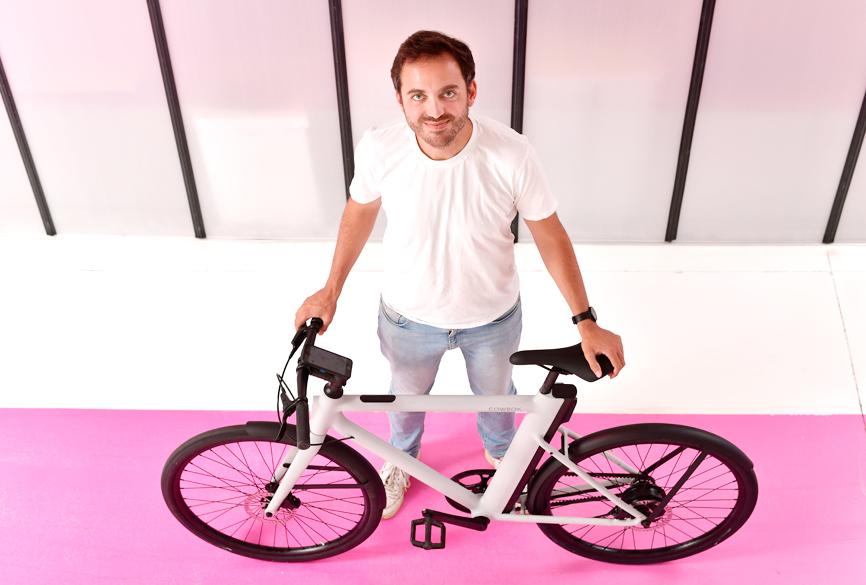What better partner for a Cowboy than a Prancing Horse?
The Agnelli family’s Exor holding company is best known as the owner of Ferrari, the four-wheeled supercar with the stallion logo.
Now, it has joined the race to invest in e-bikes with Belgian e-bike start-up Cowboy, as the two-wheeled electric commuter market shifts up a gear.

Photo: AFP
The electric bike market was already a good prospect: Industry figures show that 3 million were sold in Europe last year, one-quarter more than in 2018.
Yet a number of factors have come together this year to boost the Cowboy in Belgium, which was never as bike-friendly as the neighboring Netherlands.
As the country tackles the COVID-19 crisis, some commuters are shunning public transport, and the city of Brussels, once jammed by endless traffic jams, is transforming itself to exit the lockdown with vastly more bike lanes.
Speed limits have been cut to 30kph across 85 percent of the city, despite groans of motorists’ groups, and pedal power is up.
“So we really saw a spike, really an explosion in demand. Between January and mid-June, our sales went up three times — tripled in six months,” Cowboy founder and chief executive officer Adrien Roose said.
Five investors have joined the young firm, the biggest being Exor Seeds, a venture capital arm of a company that owns Ferrari and Juventus soccer club.
“We’re super happy to be working with them and we’re hoping to find synergies, especially in the industrial process,” Roose said.
Belgium is more hilly than low-lying Holland, and Brussels’ cobbled streets can be hard to navigate on a push bike, but the Cowboy’s detachable lithium-ion battery gives the bike a power-assisted 70km range.
Those intrigued by the concept can book a test ride at the firm’s flagship store — more like a sleek consumer tech showroom than an oily bike workshop.
Along with Dutch rivals Vanmoof and France’s Angell, Cowboy is trying to tempt a new generation of riders with bikes designed as electric from the wheels up, rather than converted pedal bikes.
Lighter batteries and smaller motors are not the only innovations: The Cowboy is digitally connected to its user — a useful security measure for a vehicle that costs more than 2,000 euros (US$2,356).
“People who buy an electric bike are rightly afraid of having their bike stolen. We’re not going to create a stronger lock than the others, but we could reduce the risk of theft,” Roose said.
“If someone steals a Cowboy electric bike, it won’t be worth anything to him, because he won’t be able to turn it on. To turn it on, you need the application with your information: your login and password,” he said.
“Secondly, if someone moves your electric bike when it’s turned off, you’ll get a notification on your mobile app, notifying you that maybe your bike is being stolen, and you can track it in real time,” Roose said.
If that does not work, Cowboy sells bike insurance.

NOT JUSTIFIED: The bank’s governor said there would only be a rate cut if inflation falls below 1.5% and economic conditions deteriorate, which have not been detected The central bank yesterday kept its key interest rates unchanged for a fifth consecutive quarter, aligning with market expectations, while slightly lowering its inflation outlook amid signs of cooling price pressures. The move came after the US Federal Reserve held rates steady overnight, despite pressure from US President Donald Trump to cut borrowing costs. Central bank board members unanimously voted to maintain the discount rate at 2 percent, the secured loan rate at 2.375 percent and the overnight lending rate at 4.25 percent. “We consider the policy decision appropriate, although it suggests tightening leaning after factoring in slackening inflation and stable GDP growth,”

DIVIDED VIEWS: Although the Fed agreed on holding rates steady, some officials see no rate cuts for this year, while 10 policymakers foresee two or more cuts There are a lot of unknowns about the outlook for the economy and interest rates, but US Federal Reserve Chair Jerome Powell signaled at least one thing seems certain: Higher prices are coming. Fed policymakers voted unanimously to hold interest rates steady at a range of 4.25 percent to 4.50 percent for a fourth straight meeting on Wednesday, as they await clarity on whether tariffs would leave a one-time or more lasting mark on inflation. Powell said it is still unclear how much of the bill would fall on the shoulders of consumers, but he expects to learn more about tariffs

Greek tourism student Katerina quit within a month of starting work at a five-star hotel in Halkidiki, one of the country’s top destinations, because she said conditions were so dire. Beyond the bad pay, the 22-year-old said that her working and living conditions were “miserable and unacceptable.” Millions holiday in Greece every year, but its vital tourism industry is finding it harder and harder to recruit Greeks to look after them. “I was asked to work in any department of the hotel where there was a need, from service to cleaning,” said Katerina, a tourism and marketing student, who would

i Gasoline and diesel prices at fuel stations are this week to rise NT$0.1 per liter, as tensions in the Middle East pushed crude oil prices higher last week, CPC Corp, Taiwan (台灣中油) and Formosa Petrochemical Corp (台塑石化) said yesterday. International crude oil prices last week rose for the third consecutive week due to an escalating conflict between Israel and Iran, as the market is concerned that the situation in the Middle East might affect crude oil supply, CPC and Formosa said in separate statements. Front-month Brent crude oil futures — the international oil benchmark — rose 3.75 percent to settle at US$77.01